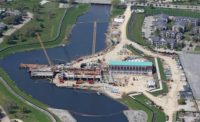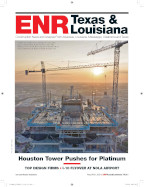Five years after work began, the Interstate-49 North Project has nearly completed a 36-mile four-lane link between Shreveport and the Arkansas state line. Cut through farmland and the rolling hills of North Caddo and Desoto parishes, the challenging $670-million project, divided into 11 segments, has prompted the Louisiana Dept. of Transportation and Development and contractors to use some unique solutions to keep it on pace.
Massive Undertaking
Four of the project's segments have been completed, six are under construction and one is set to go to bid in December, leaving five miles to be built. James Construction Group, Baton Rouge, is overseeing four of the segments that are under construction—segments E, F, G and I. The project scope includes $165 million of work covering 17 miles of interstate and 30 bridges with 618,000 sq ft of deck. All four projects started within a month of each other early in 2012 and will be completed at the end of August.
Jim Rogers, the contractor's project manager, says four large contracts running simultaneously on a tight schedule can put pressure on the firm's equipment and labor capabilities. James Construction typically handles projects ranging from $5 million to $15 million in that part of the state. "There were challenges with resources and equipment with this much work at once," he says. "For our north Louisiana operation, this was a massive undertaking."
Precise and careful scheduling was critical from the outset of the project. Planning of the roadway preparation, excavation and other stages all had to be synchronized to create a seamless and efficient workflow before paving could begin. Rogers says that in total the projects included 2.3 million cu yd of excavation, 4.9 million cu yd of embankment and 834,000 sq yd of 12-in.-stabilized subgrade and other bases leading up to paving.
To maximize equipment efficiency, the contractor completed as many linear feet of the roadway as possible before paving. Justin Mibb, the firm's concrete paving manager, says that in one area, crews were able to pave five miles continuously.
James Construction brought in two portable concrete plants and ran continuous paving operations, pouring up to 3,000 cu yd per day on the interstate. Mibb says the firm installed a dowel bar inserter attachment on the GOMACO GP-4000 mainline paver. This allowed the width of the paving machine to be expanded to 31 ft, which encompassed all of the roadway (two 12-ft lanes and a 4-ft shoulder) with the exception of a 7-ft shoulder.
"It cut down on the time and saved us one entire pass over what we would have normally done," he says.
Mibb says that aside from a third-party trucking company that was hired to assist the firm's fleet of concrete batch trucks, most of the work was performed by James Construction employees. Once paving on a segment began, operations ran around the clock until the segment was completed.
"We paved day and night to try to keep it on schedule," Mibb says. "It was a big accomplishment for our paving crews. No one had ever [paved] that volume before."








Post a comment to this article
Report Abusive Comment